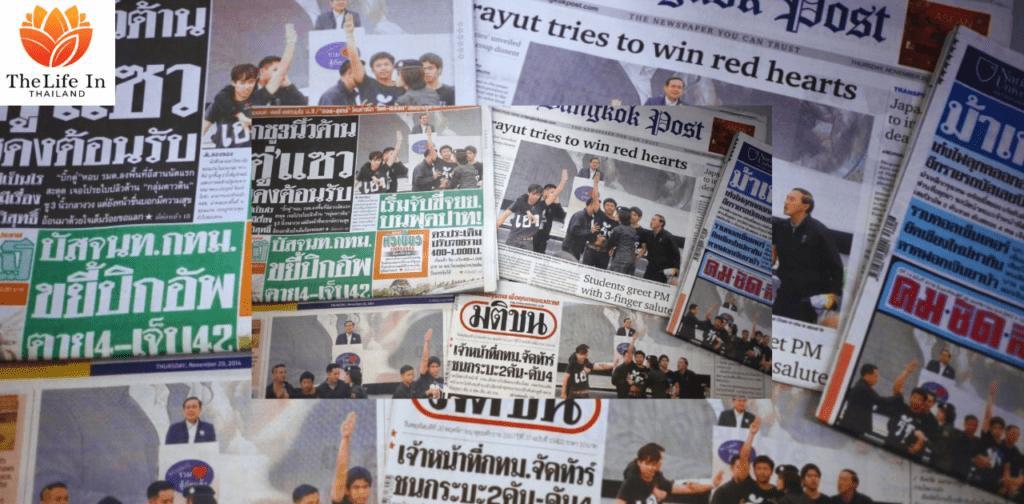In the dynamic realm of Thai media, newspapers have stood as pillars of information dissemination, cultural expression, and political discourse for over a century. From the early days of print journalism to the digital age of instant news delivery, the landscape of newspapers in Thailand has witnessed profound shifts, reflecting the changing needs and preferences of audiences. In this in-depth exploration, we delve deeper into the historical context, digital disruption, regulatory challenges, and innovative strategies shaping the present and future of newspapers in Thailand.


Historical Significance and Evolution
The inception of newspapers in Thailand can be traced back to the 19th century, a period marked by the modernization and Westernization efforts of King Rama IV and King Rama V. The establishment of Thai-language newspapers such as “Wongsawang Sawat” and “Siam Prachathipatai” played a pivotal role in fostering literacy, national unity, and political awareness among the populace. These early publications laid the foundation for a vibrant press tradition that would endure through tumultuous political transitions and societal transformations.
Throughout the 20th century, newspapers in Thailand continued to evolve, adapting to changing technologies and socio-political dynamics.
The emergence of influential publications like “Matichon” and “Bangkok Post” in the post-war era further solidified the role of newspapers as watchdogs of democracy, advocates for social justice, and platforms for public debate. However, it was the advent of the internet in the late 20th century that heralded a new era of disruption for the Thai media landscape.
Digital Disruption and Adaptation
The rise of digital technology has brought both challenges and opportunities for newspapers in Thailand. On one hand, the internet has democratized access to information, empowering citizens to become active participants in the news ecosystem. On the other hand, it has disrupted traditional business models, leading to declining circulation and advertising revenues for print newspapers. In response, many newspapers have embraced digital platforms, launching online editions, mobile apps, and multimedia content to reach wider audiences and stay relevant in the digital age.
Regulatory Pressures and Press Freedom
Despite the promise of digital innovation, newspapers in Thailand continue to face regulatory pressures that threaten press freedom and editorial independence. The enforcement of laws such as the Computer Crimes Act and the Printing Act has led to censorship, self-censorship, and legal challenges for journalists and media organizations. Moreover, the political climate in Thailand, characterized by periodic coups, military rule, and crackdowns on dissent, has further exacerbated challenges to press freedom and freedom of expression.
Innovation and Future Prospects
In the face of these challenges, newspapers in Thailand are embracing innovation and experimentation to secure their future in the digital landscape. From data-driven journalism and interactive storytelling to community engagement and reader-driven content, newspapers are exploring new ways to connect with audiences, monetize digital content, and ensure sustainability in an increasingly competitive market. Furthermore, collaborations with tech startups, media partnerships, and investments in digital infrastructure are paving the way for a more resilient and dynamic future for newspapers in Thailand.
Newspapers in Thailand: A Multilingual Landscape
Thai newspapers are published in both English and Thai languages. This bilingual approach ensures that both Thai citizens and expatriates can access relevant news. Some prominent Thai newspapers include:
Thai Rath (ไทยรัฐ): A widely read newspaper known for its comprehensive coverage of current events.
Khao Sod (ข่าวสด): Renowned for its investigative journalism and in-depth reporting.
Daily News (เดลินิวส์): A popular tabloid-style newspaper that covers a wide range of topics.
Kom Chad Luek (คมชัดลึก): Known for its incisive analysis and editorials.
Manager (ผู้จัดการรายวัน): A business-focused newspaper that provides economic insights.
English-Language Newspapers
For English-speaking readers, several newspapers cater to their needs:
Bangkok Post: A reputable English-language newspaper that covers national and international news.
The Nation: Known for its balanced reporting and editorials.
Pattaya Mail: A regional newspaper that serves both residents and tourists.
Circulation and Influence
Thai newspapers have a wide circulation across various regions, including Bangkok, Chiang Mai, Phuket, Pattaya, and more. They keep citizens informed about developments, events, and current affairs. Online news websites have grown in popularity in Thailand as the country has become more digitally connected. These platforms provide news in both Thai and English, along with multimedia content and podcasts.
The Role of Thai Newspapers
Informing the Public: Thai newspapers are an essential source of news and information for millions of readers. They offer insights into political, social, and economic matters.
Reflecting Diversity: By covering a wide range of topics, newspapers mirror the diverse interests and viewpoints of the Thai people.
Keeping Watch: Investigative journalism helps expose corruption, promote transparency, and hold authorities accountable.
Community Connection: Local newspapers connect communities, sharing stories that matter to residents.
Conclusion: Embracing Change and Upholding Values
In conclusion, the evolution of newspapers in Thai reflects the dynamic interplay between tradition and innovation, resilience and adaptation, freedom and constraint. While facing challenges posed by digital disruption and regulatory pressures, newspapers continue to uphold their fundamental role as guardians of democracy, champions of public interest, and voices of the voiceless. As Thailand navigates the complexities of the digital frontier, newspapers must remain vigilant in upholding journalistic integrity, defending press freedom, and serving the diverse needs of society.
In the ever-changing landscape of Thai media, newspapers stand as beacons of truth, enlightenment, and accountability, guiding the nation toward a brighter and more informed future.




